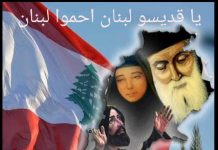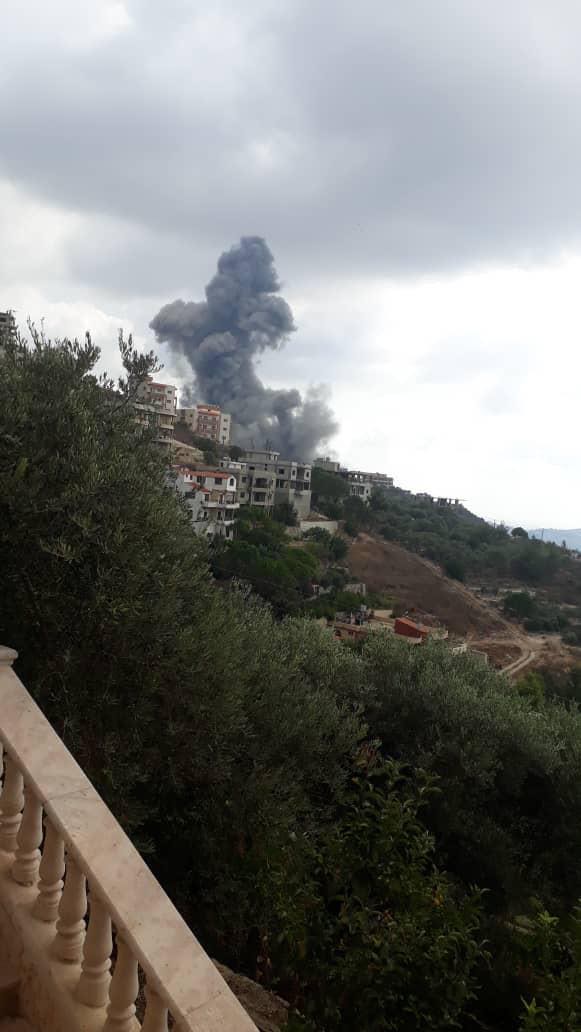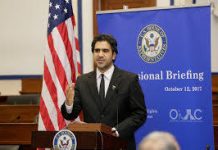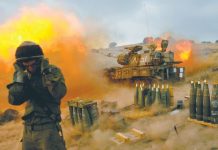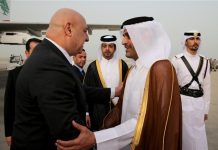New Explosion in Lebanon at Site That Belongs To Affiliate of Hezbollah
Tony Badran/FDD/September 24/2020
طوني بدران/مؤسسة الدفاع عن الديموقراطية: انفجار جديد في لبنان في موقع تابع لحزب الله
There was a large explosion in southern Lebanon yesterday (22 sept/2020) in a built-up residential area controlled by Hezbollah. The explosion underscores the risks associated with Hezbollah’s de facto control of Lebanon and the problem the terror group’s symbiotic relationship with internationally-funded state organs poses for U.S. policy.
The cause of the explosion in the southern town of Ain Qana remains unclear. The nature of the site is also uncertain, although Hezbollah admitted the site belongs to “Peace Generations Organization for Demining” (jam’iyat ajyal as-salam li naz’ al-algham), which it said used the site to store old mines and unexploded ordnance, pending proper disposal. Some reports from Lebanon claimed the site was an arms depot.
Peace Generations is a Hezbollah affiliate that began operating in 2009 as a Lebanese twin of the Immen Sazan Omran Pars in Iran, which funded it. The launch ceremony for Peace Generations was hosted by the head of Hezbollah’s parliamentary bloc, Muhammad Raad, a Specially Designated Global Terrorist.
Those in attendance included Brigadier General Muhammad Fahmi, a representative of the commander of the Lebanese Armed Forces (LAF) then serving as director of the Lebanon Mine Action Center (LMAC). Fahmi is currently the caretaker interior minister. A delegation from the United Nations Interim Force in Lebanon (UNIFIL), which supports LMAC, also attended the launch ceremony.
Peace Generations was licensed by Lebanon’s Ministry of Interior and Municipalities in 2008 and works directly with LMAC, which operates within the defense ministry.
Mahmoud Rahhal, who headed Peace Generations until his death last July, attributed the organization’s founding to a speech by Hezbollah’s secretary general, Hassan Nasrallah, “in which he declared Hezbollah’s support for the sides that will be working in this field.”
This origin story mirrors that of another Hezbollah affiliate, Green Without Borders, a self-described environmental group with which Peace Generations has a close relationship.
The two organizations are constantly present at Hezbollah functions. So too is the Islamic Health Association, an affiliate which participates in Peace Generations’ training exercises and operations.
One of the first such exercises was conducted under the supervision of Hezbollah’s then-commander of the southern sector, Nabil Qaouq, who subsequently served as deputy head of Hezbollah’s Executive Council.
Hezbollah officials also preside over anniversaries of Peace Generations’ founding, as former Hezbollah minister Muhammad Fneish did in 2015. Other party officials participate as well, such as Hussein Rahhal, the head of the party’s Electronic Media Unit, and Ahmad Safieddine, a previous commander in the southern sector who now holds the position of assistant to the head of the Executive Council.
Representatives of the LAF and LMAC, who liaise with UNIFIL, also attend, and even presented Peace Generations’ late founder, Mahmoud Rahhal, with an appreciation award.
Despite the uncertainty surrounding yesterday’s explosion, Hezbollah clearly stored weapons in a civilian area, an activity with implications under U.S. law.
In December 2018, Congress unanimously passed the Sanctioning the Use of Civilians as Defenseless Shields Act (PL 115-348), the result of legislation originally authored by Senator Ted Cruz (R-TX) and Representative Mike Gallagher (R-WI).
The law requires the president to impose sanctions on members of Hezbollah or anyone acting on Hezbollah’s behalf who “knowingly and materially supports, orders, controls, directs, or otherwise engages in” the use of civilians as human shields.
At the very least, the United States should consider Peace Generations as a possible sanctions target, along with Nabil Qaouq and Ahmad Safieddine.
The United States – which has provided assistance to the LAF’s LMAC – should freeze all LAF assistance until Washington can verify that the LMAC is no longer collaborating with Peace Generations. The United States should also request that any assistance to LMAC from the UNIFIL budget, to which the United States contributes, be suspended.
UNIFIL’s operations in Hezbollah’s stronghold have reduced the force to an aid agency working with and supporting Hezbollah’s municipalities and overall environment. The United States missed an opportunity to revoke UNIFIL’s Security Council mandate this August. Washington would do well to terminate it the next time it comes up for renewal.
*Tony Badran is a research fellow at the Foundation for Defense of Democracies (FDD), where he also contributes to FDD’s Center on Economic and Financial Power (CEFP) and Center on Military and Political Power (CMPP). For more analysis from Tony, CEFP, and CMPP, please subscribe HERE. Follow Tony on Twitter @AcrossTheBay. Follow FDD on Twitter @FDD and @FDD_CEFP and @FDD_CMPP. FDD is a Washington, DC-based, nonpartisan research institute focusing on national security and foreign policy.














